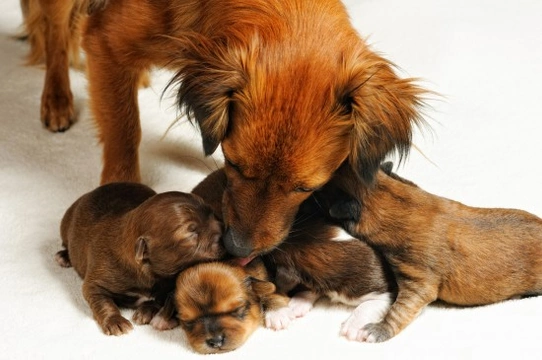
How the Dam Behaves Once Her Litter Is Born
When a female dog becomes a mother, her personality naturally changes during the first weeks as her attention focuses entirely on her new puppies. This transformation in behaviour is deeply driven by maternal instincts and hormonal changes. Understanding how the dam behaves post-birth is essential for providing proper care and reducing her stress during this demanding period.
In this guide, we explore typical maternal behaviours you can expect, how to support your dam and her litter responsibly, and how to approach her protective nature with empathy.
The Focus of Her Attention
Immediately after birth, a dam stays very close to her litter, seldom leaving their side except briefly to eat or go to the toilet. She will fiercely keep the puppies within sight and may be reluctant to leave them even for moments. This close contact ensures the puppies' warmth and safety during their most vulnerable days. It’s important to provide an accessible, quiet nesting area with ample fresh water and nutritious food, so she can maintain her strength and meet her own needs without stress.
Depending on her personality, your dog may allow trusted family members to help care for the puppies while she takes short breaks. However, some dams may be particularly protective at this stage and prefer minimal human contact. Always observe her cues and respect her desire for space when needed.
Feeding and Nutrition Needs
Nursing demands high energy output. Expect your dam’s appetite to increase significantly—often eating multiple times more than usual. Providing high-quality, palatable food and continuous access to fresh water is crucial to support her milk production and overall health. You might notice her eating with more urgency; this is normal and beneficial for her recovery.
Protective Instincts and Behaviour
The dam’s protective instincts peak immediately after birth and last for about three to four weeks while the puppies are blind and helpless. During this time, she may exhibit defensive behaviour such as growling or guarding her litter to prevent stress or perceived threats.
It’s essential to limit visitors and puppy handling to familiar individuals during these early weeks. While early socialisation of puppies is important, it must be balanced with the dam’s comfort. If she resists handling or shows signs of stress, give her space and try again cautiously later. Approaching her quietly, speaking softly, and avoiding sudden movements can help reduce tension when attending her litter.
Out-of-Character Behaviours to Expect
A dam devoted to her litter may occasionally urinate indoors near the whelping area, especially if she won’t leave her puppies to find an outdoor spot. This behaviour is normal and should not be punished. Instead, provide absorbent newspaper or puppy pads within easy reach for her convenience.
She may also show reduced tolerance for play or interaction, preferring calm and quiet surroundings. Snapping or guarding her puppies is a natural maternal response and should be met with understanding rather than punishment.
Signs She’s Uncomfortable with the Nesting Area
You may observe your dog digging or rearranging bedding and even moving puppies to a different spot. This signalling usually means she is uneasy in the current location. To ease her stress, create a quieter or more private nesting area, possibly letting her choose where to settle the litter.
Gradual Changes as Puppies Grow
As the puppies develop teeth around the fourth week, the dam’s attitude generally shifts. She may begin to nurse less and spend more time away from the litter. This process is part of weaning and encourages puppies to become independent gradually.
During this transition, continue to monitor the dam’s health and behaviour, ensuring she maintains adequate nutrition and comfort.
Conclusion: Supporting Your Dam and Her Litter
Caring for a dam once she has given birth involves patience, close observation, and respect for her natural behaviours. By providing a peaceful environment, sufficient nutrition, and respecting her protective instincts, you foster a healthy start for both mother and puppies.
Remember, each dam is unique, so adapting your care to her needs while promoting responsible breeding practices and early, gentle puppy socialisation will help ensure positive outcomes for your canine family.



